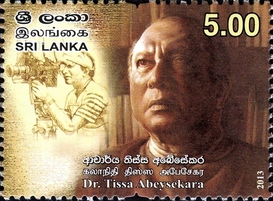|
Tissa Abeysekera nait à Maharagama (sud-est de Colombo) en 1939. Une rencontre avec Lester James Peries au début des années 1960 le fait entrer dans le milieu du cinéma, où il évoluera durant près de 40 ans. Welikatara – réalisé par Peries – lance sa carrière de scénariste. Il écrira les scénarios de Nidhanaya, Akkara Paha, Ahasin Polowata… Il réalise plus de 40 documentaires pour le Government Film Unit avant de démarrer une carrière de réalisateur avec Karumakkarayo (1980), basé sur le roman controversé de Gunadasa Amarasekara. Suivront Mahagedara (1983) et Viragaya (1988), d’après l’œuvre de Martin Wickramasinghe, que d’aucuns pensaient impossible de porter à l’écran.
En 1996, son roman Bringing Tony Home remporte le prix Gratiaen pour la meilleure œuvre de création littéraire en anglais par un résident srilankais. Tissa Abeysekera continue à écrire, principalement en anglais, jusqu’à sa disparition en 2009. [d'après Wikipédia] |
Tissa Abeysekera was born in Maharagama (southeast of Colombo) in 1939. A meeting with Lester James Peries in the early 1960s lured him to the cinema, where he remained for the next 40 years. He received co-credit for some Peries films, and the screenplay he wrote for Welikatara launched him on a career as Sri Lanka’s foremost screenplay writer. Important screenplays were those for Nidhanaya and Welikathara. In addition, he made over 40 documentaries for the Government Film Unit before breaking through as a feature filmmaker with Karumakkarayo (1980), based on Gunadasa Amarasekara’s controversial novel. This was followed by Mahagedara (1983) and Viragaya (1988), based on Martin Wickramasinghe’s novel, which was thought unfilmable.
In 1996, his novella, Bringing Tony Home, won the Gratiaen Prize for the best piece of Creative Writing in English by a resident Sri Lankan. He continued writing mostly in English, bringing out another collection of three stories, In My Kingdom of the Sun and the Holy Peak. [wikipedia]
In 1996, his novella, Bringing Tony Home, won the Gratiaen Prize for the best piece of Creative Writing in English by a resident Sri Lankan. He continued writing mostly in English, bringing out another collection of three stories, In My Kingdom of the Sun and the Holy Peak. [wikipedia]
Filmographie (réalisateur) / Filmography (director)
- 1976 : ලෝක හොරු / lōka horu
- 1980 : කරුමක්කාරයෝ / karumakkārayō
- 1982 : මහ ගෙදර / maha gedara
- 1987 : විරාගය / virāgaya ‒ The Way of the Lotus
විරාගය / virāgaya ‒ The Way of the Lotus • 1987
|
Aravinda has had doubts about traditional practices since his childhood. He's never wavered in his conviction and remained single all his life. The film depicts society in Sri Lanka from the 1920's to the 1950's. The movie is based on a novel written by Martin Wickramasinghe, who was highly supported as a writer who depicted the psychological world. [fukuoka.lg.jp]
Scénariste / Scriptwriter : Tissa Abeysekara. Source Author : Martin Wickramasinghe
Photo / DOP : Lal Wickramarachchi Montage / Editor : Lal Piyasena Décor / Artistic Director : Shesha Palihakkara Chansons / Songs : Sarath Fernando Parolier / Lyricist : Sunil Ariyaratne, Carlo Fonseka Musique / Composer : K. A. Milton Perera Maquillage / Make-up Artist : Sanath Nandasiri Interprètes / Cast : Sanath Gunatilaka, Sriyani Amarasena, Douglas Ranasinghe, Joe Abeywickrema 150’ • 35mm • Coul/Col |





